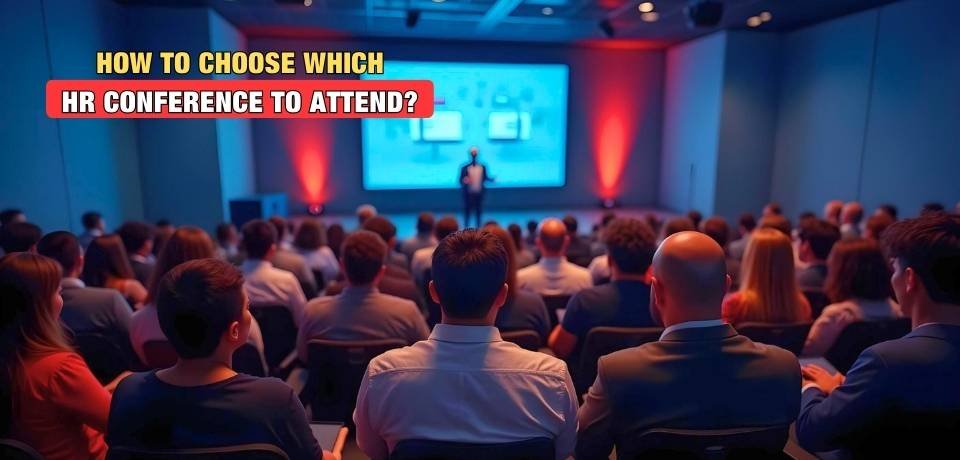Staying ahead in the dynamic field of human resources requires attending HR conferences. These events offer fresh industry insights, invaluable networking opportunities, and tools to improve your professional skills. Beyond that, they help you recharge and inspire innovation in your organization.
But how to choose which HR conference to attend since there are so many options available?
Start by identifying your career goals—what do you hope to gain? Then, research upcoming events, diving into agendas, speaker lists, and reviews from past attendees. Consider practical factors like location, budget, and whether the conference offers certification or continuing education credits.
Are you ready to make the right choice? Follow our guide as we walk you through finding the appropriate fit for your professional journey!
Why Finding the Right Conference Matters?
A good HR conference can have a significant impact on your career growth, professional network, and knowledge base. Not all conferences are created equal, and attending the wrong one may lead to wasted time and resources. Here’s why finding the right conference matters and how it can make a difference.

Network With Industry Leaders
Engaging with top HR professionals encourages meaningful relationships that last long after the event. These connections open doors to mentorships, partnerships, and collaborations. A carefully selected conference ensures you’re surrounded by like-minded peers and experts. Networking at the right event can advance your career faster than expected.
Gain Insights from Industry-Specific Topics
Every HR professional has unique challenges, and targeted conferences address these with precision. Attending the right event ensures access to relevant sessions relevant to your goals. You’ll learn actionable strategies to overcome industry-specific obstacles efficiently. This personalized knowledge makes a significant difference in your career journey.
Learn from Reputable and Inspiring Speakers
The caliber of speakers shapes the quality of insights shared at a conference. Choosing an event with respected thought leaders ensures value. Their innovative ideas and success stories leave a lasting impact on your mindset. Insightful sessions from experts energize you to tackle workplace challenges.
Stay Updated on Emerging Trends and Technologies
The HR field is growing rapidly, and being informed is essential to stay competitive. Attending conferences with a focus on innovation keeps you ahead. Discovering innovative tools and strategies transforms your approach to HR practices. Staying current empowers you to drive positive change within your organization.
Maximize Your Learning with Certifications and Credits
Many top-tier conferences offer opportunities to earn continuing education credits or certifications. These credentials bolster your professional development and credibility. Prioritize events with such offerings to improve your skills and career prospects. Professional recognition from certifications can lead to new job opportunities and promotions.
Ensure a Valuable Return on Investment
Time and money are finite resources, so attending the right conference matters. It guarantees an experience worth the effort and cost. Considering the agenda and reviews minimizes the risk of disappointment. Choosing carefully ensures you gain practical takeaways that justify your investment.
Build Lasting Motivation and Inspiration
The right conference energizes you with fresh perspectives and enthusiasm for your work. Exposure to innovative solutions renews your passion for HR. These events create an environment for inspiration and personal growth. Leaving with actionable ideas makes every moment spent worthwhile.
Finding the right HR conference is more than a simple choice—it’s an investment in your future. By aligning the event with your goals, interests, and needs, you maximize the benefits of attending. Take the time to choose wisely, and you’ll walk away inspired, connected, and ready to tackle new challenges.
How to Choose Which HR Conference to Attend?
You can build your network and advance your career by attending a good HR conference. With so many options available, you should take a thoughtful approach to ensure you make the most of your investment. Here’s a step-by-step guide to help you navigate the decision-making process.

Step 1: Clarify Your Professional Goals
Defining your objectives sets the foundation for finding the ideal conference. Pinpoint whether you aim to develop specific skills, gain knowledge, or expand your network. Staying updated with the latest HR trends and best practices should also factor into your decision. A clear purpose ensures your time and effort align with your aspirations.
Step 2: Explore Online Resources and Publications
Thorough research expands your options and helps you discover well-suited events. Platforms like HRM Conference, Global Conference Alliance Inc., and Eventbrite offer extensive lists of upcoming HR conferences. Industry magazines and journals frequently highlight top conferences and provide valuable recommendations. Combining digital resources with publications ensures a broader view of available opportunities.
Step 3: Check Conference Agendas and Topics
Scrutinizing the agenda ensures the event’s content matches your interests and professional needs. Look for sessions that address relevant challenges, emerging trends, or specific skills. Conferences with diverse, engaging topics provide a richer learning experience. Ensuring the agenda aligns with your goals guarantees a more fulfilling attendance.
Step 4: Assess Speaker Expertise
The quality of speakers can make or break a conference’s value. Prioritize events featuring industry leaders and respected experts with proven track records. High-caliber speakers deliver insights and strategies that leave a lasting impact. Their experience ensures sessions are both relevant and inspirational.
Step 5: Review Logistics and Timing
Convenience is key to ensuring a smooth and productive experience. Select a conference in an accessible location that may also offer additional networking opportunities. Ensure the dates fit seamlessly into your schedule to avoid conflicts. Proper planning ensures you can fully focus on the event without distractions.
Step 6: Factor in Budget Considerations
Balancing costs with potential benefits helps you make a financially sound decision. Assess registration fees, travel expenses, and accommodation costs to stay within your budget. Many conferences offer early bird discounts or group rates, making them more affordable. Proper budgeting ensures you maximize your return on investment.
Step 7: Read Reviews and Testimonials
Insights from past attendees provide valuable perspectives on the conference’s quality and effectiveness. Reviews highlight strengths and potential drawbacks, helping you set realistic expectations. Personal testimonials often reveal the practical benefits attendees gain. Using these insights ensures you avoid subpar events.
Step 8: Analyze Networking Opportunities
A strong conference promotes meaningful connections that can advance your career. Look for events offering networking receptions, workshops, and casual meet-ups to build your contacts. Conferences attracting diverse professionals and industry leaders enhance the chances of forming valuable relationships. Prioritizing networking opportunities can yield long-term career benefits.
Step 9: Check for Continuing Education Credits
Certifications and professional credits add lasting value to your conference experience. Conferences offering Continuing Education Units (CEUs) or certifications boost your resume and skills. Some events even include certification exams, making it easier to enhance your credentials. Opting for such conferences strengthens your professional development.
Step 10: Research the Organizers’ Reputation
The success of an event often depends on the credibility of its organizers. Look for organizers with a proven history of hosting well-executed and impactful conferences. Their experience ensures a seamless and enriching experience for attendees. Trustworthy organizers improve the event’s overall reliability and value.
Topics Discussed at HR Conferences — What Are They?
HR conferences are dynamic platforms designed to equip professionals with the knowledge and tools to excel in their roles. From recruitment strategies to legal compliance, these events cover diverse and impactful topics. Below is a breakdown of key subjects commonly explored at HR conferences.
- Talent Acquisition and Retention: Recruiting strategies focus on innovative methods to attract top-tier candidates in competitive markets. Retention techniques aim to promote engagement and reduce employee turnover rates effectively.
- Diversity, Equity, and Inclusion (DEI): DEI initiatives emphasize building workplaces that value and respect differences to improve collaboration. Bias training programs help address unconscious biases in recruitment and promotions.
- Employee Engagement and Well-being: Workplace culture efforts prioritize creating environments where employees feel valued and motivated to contribute. Wellness programs focus on supporting both physical and mental health.
- HR Technology and Data Analytics: HR software innovations simplify processes like payroll, recruitment, and performance tracking for better efficiency. Data-driven HR practices use analytics to inform strategic workforce decisions.
- Legal and Compliance Issues: Employment law updates keep professionals informed about the latest regulations affecting workplace policies. Compliance training ensures organizational practices align with labor laws and standards.
- Leadership and Development: Leadership training programs help nurture effective leaders within the organization for long-term success. Career development opportunities empower employees with skills for upward mobility.
- Compensation and Benefits: Salary structure discussions focus on competitive pay practices to attract top talent. Benefits package strategies aim to design cost-effective yet attractive offerings.
- Change Management: Managing organizational change involves addressing transitions to minimize disruptions. Change leadership equips managers to guide teams smoothly during periods of transformation.
- Workforce Planning and Analytics: Strategic workforce planning ensures organizations are prepared for future needs and growth. Talent analytics helps organizations make informed staffing decisions.
- Innovation and Best Practices: HR innovation topics explore cutting-edge ideas transforming traditional approaches. Best practice sessions share successful strategies and real-world case studies to inspire attendees.
How to Prepare Yourself For an HR Conference?
Conferences are fantastic opportunities to gain knowledge, network, and advance your career. Proper preparation ensures you make the most of your time and investment. Follow the below process to walk into the event confident and ready to succeed.

Step 1: Define Your Objectives
Knowing your goals helps you focus on what matters most during the conference. Determine whether you want to improve specific skills, learn industry trends, or expand your network. You can prioritize opportunities and sessions that align with your objectives by identifying your objectives. Clear intentions set the foundation for a productive experience.
Step 2: Research the Agenda and Speakers
Exploring the conference agenda thoroughly helps you identify the sessions that resonate most with your professional goals or current challenges. Whether you’re focusing on specific skills or broader industry insights, attending an international HR conference can provide unique perspectives and global best practices. Researching the speakers allows you to gauge their expertise, ensuring the presentations you choose are impactful and valuable.
Step 3: Prepare Questions and Discussion Points
Engaging with speakers and peers is easier when you have prepared questions. Think about the challenges you face in your role or industry. Having discussion points ensures meaningful conversations and builds rapport with other attendees. Preparation makes networking and learning opportunities more impactful.
Step 4: Network in Advance
Reaching out to fellow attendees or speakers before the event creates connections early. Use social media platforms like LinkedIn to engage with others planning to attend. Building a network beforehand makes introductions and conversations during the conference smoother. Advance networking increases your confidence and enhances your overall experience.
Step 5: Organize Your Essentials
Preparing your materials ensures a seamless conference experience. Bring business cards, a notebook, and devices like a tablet or laptop for note-taking. Dress professionally but comfortably, considering the event’s tone and schedule. Organizing essentials avoids last-minute stress and helps you focus on the event.
Step 6: Review Logistics and Plan Your Travel
Ensuring your travel and accommodations are sorted prevents unnecessary distractions. Double-check the event location, schedule, and venue details to avoid confusion. Arriving early gives you time to settle in and familiarize yourself with the environment. A well-planned arrival sets the stage for a smooth start to the conference.
Step 7: Keep an Open Mind
Being flexible allows you to adapt to unexpected opportunities or changes in plans. Stay open to conversations with new people, even outside your immediate focus. Sometimes, impromptu discussions or sessions offer the most valuable takeaways. An open mindset enhances your overall conference experience.
What Benefits an HR Conference Can Have on Your Career Growth?
You gain insights, develop your skills, and broaden your network at conferences. By attending, you position yourself to stay ahead in an evolving industry. Here are some key benefits that directly impact your career growth.

Gain Leading-Edge Industry Knowledge
Learning about emerging trends helps you stay relevant in the ever-changing HR environment. Conferences showcase innovative strategies and new best practices. Access to industry thought leaders provides insights not readily available elsewhere. Staying informed makes you a valuable resource within your organization.
Expand Your Professional Network
Connecting with peers and experts opens doors to collaborations and mentorship opportunities. HR conferences create an environment for meaningful and lasting relationships. Networking increases your visibility in the industry and builds your reputation. A strong professional network often leads to new opportunities.
Enhance Problem-Solving Skills
Exposure to diverse perspectives can help you approach challenges with fresh ideas. Workshops and sessions provide practical solutions to workplace issues. Learning from real-world case studies improves your decision-making abilities. Improved problem-solving skills make you more effective in your role.
Boost Your Leadership Potential
Leadership-focused sessions teach you how to manage teams and promote growth. These conferences often offer training in decision-making and communication. Developing leadership qualities makes you a strong candidate for career advancement. A focus on leadership improves both your confidence and capability.
Earn Certifications and Professional Credits
Many conferences offer certifications that strengthen your credentials and expertise. Earning credits ensures you stay compliant with professional development requirements. These achievements showcase your dedication to staying informed and skilled. Certifications are valuable assets for career progression and recognition.
Discover Opportunities for Innovation
Exploring new technologies and methodologies equips you to bring fresh ideas to your organization. HR conferences spotlight tools that optimize processes and improve efficiency. Implementing these innovations positions you as a forward-thinking professional. Staying innovative enhances your value and competitiveness.
Can You Give Presentation at HR Conference as an Attendee?
Yes, it’s possible to present at an HR conference even if you’re an attendee, but it requires preparation and initiative. Many conferences allow attendees to share insights through breakout sessions or panel discussions. To secure a spot, you’ll typically need to propose a topic aligned with the conference theme. Here are the key factors involved in presenting at an HR conference as an attendee.
Submit a Strong Proposal
Preparing a detailed and compelling proposal is essential to secure a presentation slot. Highlight your topic’s relevance to the conference’s focus areas. Clearly outline the learning outcomes or benefits attendees will gain from your session. A well-prepared proposal significantly increases your chances of being selected.
Align Your Expertise with Conference Themes
Choosing a topic within your expertise ensures you deliver a confident and impactful presentation. Research the event’s agenda to match your content with its themes. This alignment is crucial when finding a HR conference to present and connecting with its audience. Relevant topics make your proposal more appealing to organizers.
Engage with Conference Organizers
Building relationships with the event organizers can open doors for speaking opportunities. Introduce yourself and express interest in contributing to the event’s success. Share your professional background and areas of expertise to establish credibility. Staying proactive increases your visibility and likelihood of being considered.
Utilize Your Professional Achievements
Showcasing your accomplishments reinforces your qualifications as a speaker. Highlight successful projects, innovative solutions, or unique perspectives you’ve contributed to the HR field. Use these examples to demonstrate the value you can bring to attendees. Backing your application with achievements strengthens your case for presenting.
Prepare to Speak on Short Notice
Sometimes, opportunities to present arise due to last-minute cancellations or schedule adjustments. Being prepared allows you to step in confidently and seize the chance. Keep a polished presentation ready that aligns with common HR conference themes. Flexibility ensures you don’t miss unexpected opportunities.
Promote Your Session in Advance
Once confirmed, use your network to spread the word about your presentation. Announce your session on social media platforms like LinkedIn to build anticipation. Engaging with potential attendees beforehand ensures a strong turnout at your session. Promotion increases your impact and visibility within the HR community.
Tips to Help You Plan Your HR Conference Participation
Planning your conference participation effectively can help ensure you don’t miss out on significant opportunities. Here are some tips to help you make the most of your experience:

Pre-Conference Planning
- Review the Agenda: Study the conference schedule in advance and highlight sessions that are most relevant to your goals.
- Set Clear Objectives: Define what you want to achieve by attending the conference, such as learning new skills, networking, or gaining insights into industry trends.
Create a Personal Schedule
- Prioritize Sessions: Mark the must-attend sessions, workshops, and keynotes that align with your objectives.
- Balance Activities: Include time for networking, visiting exhibits, and attending social events.
Utilize Conference Apps and Tools
- Download the App: Many conferences offer mobile apps that provide real-time updates, session schedules, and networking tools.
- Set Reminders: Use the app to set reminders for sessions and events you want to attend.
Plan Your Networking Strategy
- Identify Key Contacts: Research speakers, attendees, and exhibitors you want to meet.
- Schedule Meetings: Arrange one-on-one meetings with key contacts during breaks or networking sessions.
Stay Flexible
- Adapt to Changes: Be prepared to adjust your schedule if new opportunities arise or sessions get rescheduled.
- Allow Buffer Time: Leave some gaps in your schedule for spontaneous networking or rest.
Take Notes and Document Insights
- Use a Notebook or App: Take notes during sessions to capture key takeaways and ideas.
- Reflect Daily: Review your notes at the end of each day to consolidate your learning and plan for the next day.
Engage Actively
- Participate in Discussions: Ask questions and join discussions during sessions to deepen your understanding.
- Connect on Social Media: Engage with other attendees and share your conference experience using event hashtags.
Follow Up Post-Conference
- Send Follow-Up Emails: Reach out to new contacts and follow up on conversations you had during the conference.
- Share Insights: Share what you’ve learned with your team or write a summary blog post.
Attend Social Events
- Networking Events: Make time for networking receptions, dinners, and other social events to build relationships in a more relaxed setting.
- Local Activities: Participate in local tours or activities organized by the conference to bond with other attendees.
Pack Wisely
- Business Cards: Bring plenty of business cards to exchange with new contacts.
- Comfortable Clothing: Wear professional yet comfortable clothing and shoes, as conferences can involve a lot of walking.
What Do You Need to Network Effectively at HR Conference?
Networking at an HR conference is a valuable opportunity to connect with professionals, share knowledge, and build lasting relationships. To make the most of these interactions, preparation and strategy are essential. Here are the key elements you need to network effectively at an HR conference.
- Set Clear Networking Goals: Define what you want to achieve, such as finding mentors, collaborators, or new career opportunities. Clear goals help you focus your efforts on meaningful connections.
- Research Attendees and Speakers: Learn about the people attending or speaking at the conference to identify those relevant to your interests. This preparation ensures engaging and purposeful conversations.
- Prepare an Elevator Pitch: Prepare a concise introduction that highlights your role, expertise, and goals. A strong pitch makes a lasting impression and encourages further dialogue.
- Utilize Social Media Before the Event: Connect with attendees on platforms like LinkedIn to establish rapport before meeting in person. Pre-event interaction creates a smoother introduction at the conference.
- Bring Business Cards and Digital Contact Methods: Carry professionally designed business cards to share your information easily. Include a QR code linking to your LinkedIn profile or portfolio.
- Attend Networking Sessions and Breakout Activities: Participate in scheduled networking events, workshops, or meetups to maximize your exposure. These structured settings make it easier to approach others.
- Follow Up After the Conference: Send personalized messages to those you connected with to maintain and strengthen relationships. Timely follow-ups show professionalism and genuine interest.
FAQs about How to Choose Which HR Conference to Attend?
Choosing the right HR conference can feel overwhelming with so many options available. To help simplify the process, here are seven frequently asked questions and answers that address key considerations when selecting the perfect HR event for your goals.
Should I Prioritize Virtual or In-Person Conferences?
Consider in-person events if networking and hands-on workshops are your priorities. Virtual conferences are ideal for budget constraints or flexible learning. Both offer unique advantages, so choose based on your learning preferences and schedule flexibility.
How Can I Assess the Conference’s Credibility?
Check the organizer’s track record and history of successful events. Look for reputable speakers and partners involved in the event. Reading reviews and testimonials from past attendees also helps gauge its value and reliability.
Is It Better to Attend a Niche or General HR Conference?
If you want deep insights on a specific topic, a niche conference is ideal. General conferences cover broader areas, offering a mix of content that benefits diverse interests. Match your career focus to the event type.
How Do I Evaluate Networking Opportunities at a Conference?
Examine the attendee profile, such as their roles and industries, to see if they align with your goals. Check for organized networking activities like workshops, receptions, or meetups. Strong networking opportunities enhance your experience and career connections.
Are Smaller Conferences Better Than Larger Ones?
Smaller conferences often provide intimate settings for deeper connections and focused learning. Larger conferences offer extensive sessions, renowned speakers, and broader networking. Consider your goals—whether it’s personalized engagement or exposure to a wide array of resources.
Should I Attend Conferences Held in My Industry’s Region?
Regional conferences offer relevant local insights and cost-effective travel options. However, exploring events outside your region expands your perspective and connects you with a diverse audience. Strike a balance between convenience and the potential for broader exposure.
How Can I Determine If the Conference Is Worth the Cost?
Compare the registration fee with the benefits like networking, certifications, and high-value content. Look for additional perks like early bird discounts or group rates. Balancing your goals with the value provided ensures your investment is worthwhile.
Wrap Up
You can expand your network, gain insight, and grow professionally through HR conferences. From selecting relevant sessions to engaging actively with peers, thoughtful planning ensures a productive and enriching experience. Knowing how to choose which HR conference to attend plays a pivotal role in maximizing these benefits.
Aligning your goals, evaluating the agenda, and considering practical factors like budget and networking opportunities help you make the right choice. By investing in the right event and preparing effectively, you can unlock new opportunities, stay ahead of industry trends, and bring innovative ideas back to your organization.
